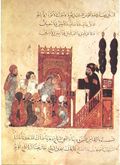المعتز بالله
| al-Mu'tazz المعتز | |||||
|---|---|---|---|---|---|
| Caliph Commander of the Faithful | |||||
 | |||||
| 13th Caliph of the Abbasid Caliphate | |||||
| العهد | 25 January 866 — 13 July 869 | ||||
| سبقه | al-Musta'in | ||||
| تبعه | al-Muhtadi | ||||
| وُلِد | c. 847 Samarra, Abbasid Caliphate | ||||
| توفي | July/August 869 (aged 22) Samarra, Abbasid Caliphate | ||||
| الدفن | |||||
| Consort | Fatimah Khatun bint al-Fath ibn Khaqan | ||||
| الأنجال | Abdallah ibn al-Mu'tazz | ||||
| |||||
| الأسرة | Abbasid | ||||
| الأب | al-Mutawakkil | ||||
| الأم | Qabiha | ||||
| الديانة | Sunni Islam | ||||
المعتز بالله هو الخليفة العباسي أبو عبد الله المعتز بن المتوكل بن المعتصم بن الرشيد وأمه ام ولد اسمها قبيحة ولد سنة 231هـ. بويع بالخلافة بعد خلع المستعين بالله في 4 محرم سنة 252هـ. ولم يزل والياً إلى أن خلع نفسه في 27 من رجب سنة 255هـ.
كان عمره يوم ولي الخلافه تسعة عشر عاماً، كان بديع الحسن. قال علي بن حرب: ما رأيت خلفة أحسن منه، وهو أول من أحدث اي أوجد الركوب بحلية الذهب وكان الخلفاء يركبون بالحلية الخفيفة الفضة.
وفي أول سنة من خلافته توفي أشناس التركي الذي استخلفه الواثق على السلطنة، فاستخلف المعتز محمد بن عبد الله بن طاهر ثم عزله، فاستخلف اخاه أبا أحمد وتوجه بتاج من الذهب ثم عزله بعد حين. وسلطن بغا الشرابي فخرج على المعتز وقتل لذلك.
وحصل أن جلد أخيه المؤيد وخلعه من ولاية العهد فمات من الجلد فأتى بالشهود أنه لم يقتل اخاه.
وبعد حين في رجب 255 هـ، تمرد الاتراك على قائدهم بن وصيف وطلبوا الأموال من المعتز وقد سأل أمه، قبيحة، فلم تعطه بخلاً منها فاتفق الترك على قتله وصلبوه وخلعوه وبايعوا محمد بن الواثق وقتلوه في 27 رجب سنة 255 للهجره وهو أول خليفه مات عطشاً.
. . . . . . . . . . . . . . . . . . . . . . . . . . . . . . . . . . . . . . . . . . . . . . . . . . . . . . . . . . . . . . . . . . . . . . . . . . . . . . . . . . . . . . . . . . . . . . . . . . . . . . . . . . . . . . . . . . . . . . . . . . . . . . . . . . . . . . . . . . . . . . . . . . . . . . . . . . . . . . . . . . . . . . . .
الخلافة

Rivalries between the Turkish leaders led to a split in 865, when al-Musta'in, Wasif, and Bugha left Samarra for Baghdad, where they arrived on 5/6 February 865. There they were joined by many of their followers, and allied with the city's Tahirid governor, Muhammad ibn Abdallah ibn Tahir, who began fortifying the city. The bulk of the Turks, however, remained in Samarra. Their position was threatened by this coalition, so they released al-Mu'tazz and proclaimed him caliph. On 24 February, al-Mu'tazz placed his brother Abu Ahmad (the future al-Muwaffaq) in charge of the army, and sent him to lay siege to Baghdad.[1][2][3] Abu Ahmad played a leading role in the siege, which created a close and lasting relationship with the Turkish military, that would later allow him to emerge as the virtual regent of the caliphate alongside his brother al-Mu'tamid (ح. 870–892).[4]
The siege dragged on until December 865, when a combination of privations, lack of money to pay its supporters, and the price hikes caused by the siege eroded support for al-Musta'in's regime. As a result, Muhammad ibn Tahir opened negotiations with the besiegers, and a settlement was reached, which amounted to a mutual compromise over the sharing of the empire's proceeds: the Turks and other troops of Samarra received two-thirds of annual state revenue, while the remainder would go to Ibn Tahir and his Baghdad forces. As part of the agreement, al-Musta'in would abdicate, in exchange for an annual pension of 30,000 dinars.[5] Thus on 25 January 866, after the surrender of Baghdad, al-Mu'tazz became officially the sole, legitimate caliph.[6]
Although he was placed on the throne by the Turks, al-Mu'tazz proved a capable ruler and was determined to restore the authority and independence of his office.[7] He appointed as his vizier Ahmad ibn Isra'il, who had formerly served as his secretary during al-Mutawakkil's reign.[6][8] Al-Mu'tazz moved quickly to sideline any potential rivals. Thus, despite his pledge of safety to al-Musta'in, in October/November 866 al-Mu'tazz had his predecessor assassinated at al-Katul in Samarra.[6] In the same way he had his younger brother al-Mu'ayyad executed, even after forcing him to again renounce his rights to succession.[6] Finally, Abu Ahmad, although initially welcomed with much honor by the Caliph for his role in winning the civil war, was also imprisoned along with al-Mu'ayyad. However, his support from the military saved his life. He was eventually released and sent to Basra before being allowed to settle in Baghdad.[9] The Caliph then targeted the powerful Turkish commanders Wasif al-Turki and Bugha al-Saghir. The first move against them in late 866 failed due to the opposition of the army, and the two men were restored to their posts.[10] In the next year, however, Wasif was killed by Turkish troops that had mutinied demanding the payment of their arrears, while Bugha was imprisoned and executed on the Caliph's orders in 868. Another powerful Turkish commander, Musa ibn Bugha al-Kabir, was effectively exiled to Hamadan at the same time.[7][11]
Despite these successes, the Caliph could not overcome the main problem of the period: a shortage of revenue with which to pay the troops. The financial straits of the Caliphate had become evident already at his accession—the customary accession donative of ten months' pay for the troops had to be reduced to two for lack of funds—and had helped bring down the regime of al-Musta'in in Baghdad.[5] The civil war and the ensuing general anarchy only worsened the situation, as revenue stopped coming in even from the environs of Baghdad, let alone more remote provinces.[12] As a result, al-Mu'tazz refused to honor his agreement with Ibn Tahir in Baghdad, leaving him to provide for his own supporters; this led to unrest in the city and the rapid decline of Tahirid authority.[13] The turmoil in Baghdad was worsened by al-Mu'tazz, who in 869 dismissed Ibn Tahir's brother and successor Ubaydallah, and replaced him with his far less capable brother Sulayman.[14] In the event, this only served to deprive the Caliph of a useful counterweight against the Samarra soldiery and allowed the Turks to regain their former power.[7]
As a result, by 869 the Turkish leaders Salih ibn Wasif (the son of Wasif al-Turki) and Ba'ikbak were again in the ascendant and secured the removal of Ahmad ibn Isra'il.[14] Finally, unable to meet the financial demands of the Turkish troops, in mid-July a palace coup deposed al-Mu'tazz. He was imprisoned and maltreated to such an extent that he died after three days, on 16 July 869.[14] He was succeeded by his cousin al-Muhtadi.[14]
المصادر
- Bianquis, Thierry (1998). "Autonomous Egypt from Ibn Ṭūlūn to Kāfūr, 868–969". In Petry, Carl F. (ed.). Cambridge History of Egypt, Volume One: Islamic Egypt, 640–1517. Cambridge: Cambridge University Press. pp. 86–119. ISBN 978-0-521-47137-4.
- قالب:The Cambridge History of Iran
- Bosworth, C. E. (1993). "al-Muʿtazz Bi'llāh". In Bosworth, C. E.; van Donzel, E.; Heinrichs, W. P.; Pellat, Ch. (eds.). The Encyclopaedia of Islam, New Edition, Volume VII: Mif–Naz. Leiden: E. J. Brill. pp. 793–794. ISBN 90-04-09419-9.
{{cite encyclopedia}}: Invalid|ref=harv(help) - قالب:Gordon-The Breaking of a Thousand Swords
- قالب:Kennedy-The Armies of the Caliphs
- قالب:The Prophet and the Age of the Caliphates
- Kennedy, Hugh (2006). When Baghdad Ruled the Muslim World: The Rise and Fall of Islam's Greatest Dynasty. Cambridge, MA: Da Capo Press. ISBN 978-0-306814808.
- Kraemer, Joel L., ed. (1989). The History of al-Ṭabarī, Volume XXXIV: Incipient Decline: The Caliphates of al-Wāthiq, al-Mutawakkil and al-Muntaṣir, A.D. 841–863/A.H. 227–248. SUNY Series in Near Eastern Studies. Albany, New York: State University of New York Press. ISBN 978-0-88706-874-4.
- Saliba, George, ed. (1985). The History of al-Ṭabarī, Volume XXXV: The Crisis of the ʿAbbāsid Caliphate: The Caliphates of al-Mustaʿīn and al-Muʿtazz, A.D. 862–869/A.H. 248–255. SUNY Series in Near Eastern Studies. Albany, New York: State University of New York Press. ISBN 978-0-87395-883-7.
| سبقه المستعين بالله |
الخلافة العباسية ***–*** |
تبعه المهتدي بالله |
- ^ Saliba 1985, pp. 28–44.
- ^ Kennedy 2001, p. 135.
- ^ Kennedy 2004, pp. 171–172.
- ^ Kennedy 2001, pp. 149ff..
- ^ أ ب Kennedy 2001, pp. 138–139.
- ^ أ ب ت ث Bosworth 1993, p. 793.
- ^ أ ب ت Kennedy 2004, p. 172.
- ^ Kraemer 1989, p. 164.
- ^ Kennedy 2001, p. 149.
- ^ Saliba 1985, pp. 122–124.
- ^ Bosworth 1993, pp. 793–794.
- ^ Kennedy 2001, p. 138.
- ^ Kennedy 2001, p. 139.
- ^ أ ب ت ث Bosworth 1993, p. 794.

